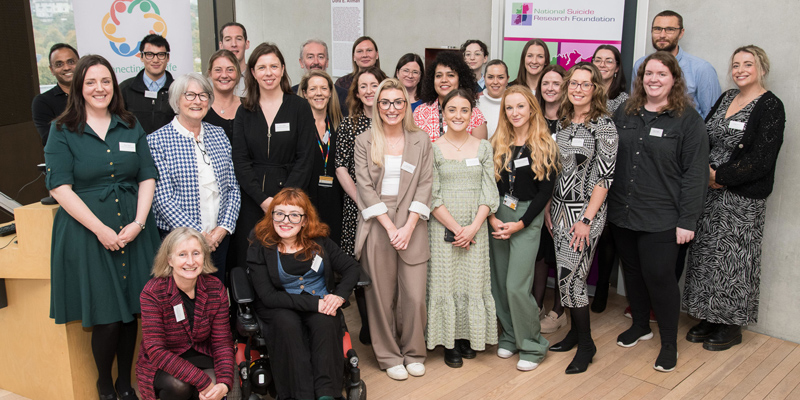In This Section
Advancing global impact of research in suicide prevention and mental health

- The National Suicide Research Foundation, located at UCC, redesignated as a WHO Collaborating Centre for Surveillance and Research in Suicide Prevention.
- The long-standing collaborative partnership between UCC and the NSRF will continue its work in the prevention and intervention of suicide.
The World Health Organisation (WHO) has redesignated the National Suicide Research Foundation (NSRF), based at University College Cork (UCC), as a WHO Collaborating Centre (WHOCC) for Surveillance and Research in Suicide Prevention.
The NSRF, primarily funded by the Government of Ireland through the Department of Health and the HSE as part of Connecting for Life, Ireland’s National Strategy to Reduce Suicide 2015-2024, is an independent multi-disciplinary research unit, located at UCC’s Western Gateway Building, provides evidence-based policy development and intervention in the prevention of suicide and in the management of patients presenting with self-harm.
The redesignation status enables the WHO and NSRF, with support from the Department of Health in Ireland, to continue to build on the initial 8 year designation by providing technical support informing the establishment of surveillance systems of self-harm and suicide and improving suicide monitoring in specific countries; and guiding and supporting countries in establishing national suicide prevention strategies and implementation, including evaluation plans and measurable indicators, in addition to contributions to the following resources:
- Preventing Suicide: A resource for filmmakers and others working on stage and screen
- National Suicide Prevention Strategies: Progress, examples, and indicators
- Live Life: An Implementation Guide for Suicide Prevention in Countries
- WHO Mental Health at work guidelines
Researchers in the NSRF, located at UCC’s Western Gateway Building, the School of Public Health and other Schools and Departments in UCC’s College of Medicine and Health, have developed several collaborative initiatives in the area of public mental health, including collaborative research grants, capacity building and civic and community engagement that includes the first PhD research training programme in Public Mental Health: MHAINTAIN - Early Identification of Suicide and Self-Harm Risk and Comorbid Mental and Physical Disorders: An Interdisciplinary Training, Research and Intervention Programme, in Ireland, funded by the HRB.
Professor Ella Arensman, Chief Scientist at National Suicide Research Foundation and Head of the School of Public Health, UCC, WHOCC lead states: "The redesignation of the NSRF’s WHOCC is a reflection of the specialist expertise and high-quality research in the area of self-harm/suicide surveillance and suicide prevention, which has been crucial in making a difference in a growing number of other countries globally."
Dr Alexandra Fleischmann, Department of Mental Health and Substance Use at the World Health Organization, states that: "WHO Collaborating Centres are essential for WHO to fulfil its mandated activities and to ensure the scientific validity of global health work. In particular, the National Suicide Research Foundation (NSRF) provides strategic support in developing and strengthening capacity in surveillance and research for suicide prevention in countries and regions. WHO highly appreciates having this top centre among the WHO Collaborating Centres and that the National Suicide Research Foundation (NSRF) is part of the international collaborative network."
Mary Butler TD, Minister of State for Mental Health, and Older People said: "I am pleased that the National Suicide Research Foundation (NSRF) has been re-designated as a Collaborating Centre by the World Health Organisation. The NSRF has worked extensively for many years with international partners and their re-designation as a WHO collaborating centre is a tribute to the excellent work the NSRF has done in Ireland and in supporting other countries in the development of national suicide prevention programmes, and in their efforts to establish and maintain their own surveillance systems for suicide and self-harm. Globally, there are just five such research centres in the world recognised by the WHO as collaborating centres in suicide research and prevention. I whole-heartedly commend the efforts of the National Suicide Research Foundation and congratulate them on their fantastic achievement."
